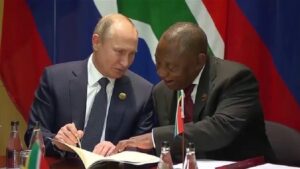By Lisa Vives, Global Information Network
NEW YORK (IDN) — In a new “scramble for Africa”, Russia and China are cutting deals, extending loans, making friends and allies across the continent at a time when jihadists in many countries have posed a growing threat to citizens and national security forces.
The original Scramble for Africa, also called the Partition of Africa, or the Conquest of Africa, was the invasion, annexation, division, and colonization of most of Africa by seven Western European powers during a short period known as New Imperialism (between 1881 and 1914).
The 10 percent of Africa that was under formal European control in 1870 increased to almost 90 percent by 1914, with only Ethiopia (Abyssinia) and Liberia remaining independent, though Ethiopia would later be invaded and occupied by Italy in 1936.
Then came the Cold War. with communists and “non-communists” vying for influence on the resource-rich continent. Some nations sided with the Soviet Union, while others sided with the U.S.
Treating Africa as a venue for superpower conflict rather than a place with intrinsic value distorted U.S. policy in the region. In some ways that legacy continues today.
A new competitor, China, is spending billions on infrastructure projects to secure mineral rights, while Russia provides security through Kremlin-allied mercenaries.
“We see and realize that if we withdraw from this competition as liberal democracies, then others are going to fill these gaps,” said Annalena Baerbock, a leader of Germany’s Green Party and the first female foreign minister, as Western diplomats huddled on the Ukraine crisis days before Russia’s invasion.
Unfortunately, knowing about the past does not always prevent repeating it. There are signs that another round of competition in Africa between external powers may be on the way. If history holds, this one could end up as badly for the continent, writes Steven Metz of World Politics Review.
Russian inroads on the continent include Sudan, Mali, the Central African Republic and South Africa. Last month, Sudanese General Mohamed Hamdan Dagolo met with Kremlin officials in Moscow on the eve of Russia’s invasion into Ukraine to discuss a new economic-focused alliance.
Upon returning home, Gen. Dagolo announced that Sudan would be open to allowing Russia to build its long hoped-for naval base at Port Sudan on the Red Sea.
In December, the U.S. and Europe expressed alarm at reports that the Wagner Group had signed a $10 million-a-month security contract with the Malian government. Observers say Wagner exploited local unhappiness over a disappointing years-long French-led deployment in the sub-Saharan targeting extremist factions. They hope for better results from the Russian fighters.
“Long live Russia!” one man in a crowd was heard to cry, cheering the sight of a Russian delegation in Bamako in January. “Long live the people of Mali!”
The Wagner group is also helping to support President Faustin-Archange Touadera of the Central African Republic (CAR) in the fight against rebels who still control many parts of the country despite recent government advances. Mr. Touadera, in power since 2016, had struggled to defeat rebel forces despite the presence of French troops and a UN force. He believes the Russian mercenaries have had more success.
UN experts believe there could be more than 2,000 instructors deployed by Russia to the CAR, including recruits from Syria and Libya, where Wagner has been active.
In South Africa, President Cyril Ramaphosa says he has been asked to help mediate peace between Russia and Ukraine, after having spoken to his counterpart Vladimir Putin. But some analysts are questioning whether South Africa’s ties to Russia could impact its neutrality. At a recent U.N. vote to reprimand Russia over the invasion of neighbouring Ukraine, South Africa abstained from the vote.
According to Ramaphosa, the UN resolution did not promise meaningful engagement. “The call for peaceful resolution through political dialogue is relegated to a single sentence close to the conclusion of the final text,” he said. But according to the official opposition, the Democratic Alliance, Ramaphosa may have been influenced by Russian oligarch, Victor Vekselberg, who has donated R7,5 million (close to $500,000 US) to the ANC. [IDN-InDepthNews – 15 March 2022]
Photo: Russian President Vladimir Putin and his South African counterpart Cyril Ramaphosa met on the sidelines of the 10th BRICS summit in 2018.


